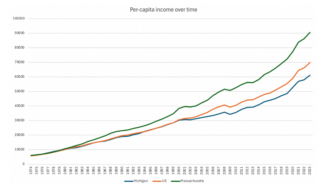Last fall, we released our proposal for a Working Parents Tax Credit (WPTC) here in Michigan – a large, refundable tax credit directed to working parents with young children, to help defray the high cost of childcare and combat the so-called “benefit cliff.” Our proposal would send non-affluent working parents $5,000 for each child under 3 and $2,500 for each child between 3 and 6.
The motivation behind the proposal was two-fold. First, far too many non-affluent households in Michigan struggle to pay for basic necessities. This is particularly true for working parents with young children who, on top of everything else, face childcare costs averaging $11,000 per year. These households need more support.
But in addition, we felt that these households needed this support in the form of more income, not more programs. Programs are often difficult to apply for and limited in scope and scale. Cash, distributed through the tax code, is easy to apply for and can reach the vast majority of eligible households. Programs are narrowly defined for a single purpose (e.g., food, housing, childcare), limiting how families can spend the available resources. Cash is flexible, allowing households to put the money towards whatever need is most pressing for their household.
So this was our motivation behind developing the working parents tax cut: working parents with young kids need more support, and that support should come in the form of cash, not programs.
To make sure we were right, however, we recently fielded a large poll to see if Michiganders agreed with us. It turns out they do.
The poll reached 500 Michiganders, and achieved broad representation by race, income, age, family structure, and political ideology. Respondents answered a range of questions about the proposal, whether we should support non-affluent working parents with programs or cash, and what the government’s role is in helping families keep up with the cost of living. What we learned is that:
- After reading a short description of the proposal, including its $1 billion price tag, 69 percent of Michiganders support the WPTC. After receiving more information and key messages about the proposal, overall support jumps to 76 percent.
- The proposal was supported by 88 percent of Democrats, but also 68 percent of Independents, and 53 percent of Republicans, demonstrating broad bi-partisan appeal.
- The proposal was supported across subgroups, with more than 60 percent of each sub-group (by race, age, and income) supporting the measure. Perhaps most surprisingly, 69 percent of non-parents supported the measure, matching the share of parents who supported the measure.
- When asked whether government should help families keep up with the costs of living by cutting taxes or funding specific programs 63 percent of Michiganders opted for reducing taxes on working parents.
- And overall, 93 percent of Michiganders think it is an important priority for the governor and the legislature to help Michigan families keep up with the cost of living.
In our briefings with the pollsters, they have been astounded by these results. They told us it is hard to find an issue that achieves this level of broad bipartisan support, across race, income, age, and family structure. It’s even rarer, they said, to find this level of support for a policy when voters know it comes with a high price tag.
In an era marked by division, it seems Michiganders can unite on the need to deliver more supports to working parents with young children, who are struggling to pay for the basics. It seems Michiganders recognize that the best way to help these households is not through more programs, but by delivering more income, for those households to spend as they see fit. And it seems Michiganders recognize that delivering this support is worth the cost.







